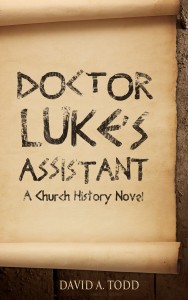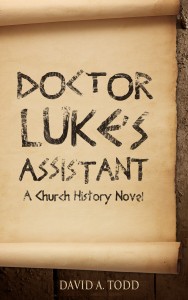Several posts ago I talked about the goals I had in mind for Doctor Luke’s Assistant. I thought I did a good job in that post of explaining what I wanted to accomplish with the book. However, today it received a review on Amazon that spoke to another motivation I had. Hence this post.
The other goal was to make people realize the importance of all four gospels, how they are different, and how it takes all four for us to have a complete picture of Jesus and what was going on around him. I believe the specific passage I read in the gospels that was the impetus to begin this work was the Triumphal Entry of Jesus Christ into Jerusalem (what the modern church calls Palm Sunday), and within that passage the obtaining of the donkey for Jesus to ride in on. Here’s what the four gospels have to say about that.
Mark: As they approached Jerusalem and came to Bethphage and Bethany at the Mount of Olives, Jesus sent two of his disciples, saying to them, “Go to the village ahead of you, and just as you enter it, you will find a colt tied there, which no one has ever ridden. Untie it and bring it here. If anyone asks you, ‘Why are you doing this?’ tell him, ‘The Lord needs it and will send it back here shortly.'” They went and found a colt outside in the street, tied at a doorway. As they untied it, some people standing there asked, “What are you doing, untying that colt?” They answered as Jesus had told them to, and the people let them go.
Matthew: As they approached Jerusalem and came to Bethphage on the Mount of Olives, Jesus sent two disciples, saying to them, “Go to the village ahead of you, and at once you will find a donkey tied there, with her colt by her. Untie them and bring them to me. If anyone says anything to you, tell him that the Lord needs them, and he will send them right away.” …The disciples went and did as Jesus instructed them.
Luke: As he approached Bethphage and Bethany at the hill called the Mount of Olives, he sent two of his disciples, saying to them, “Go to the village ahead of you, and as you enter it, you will find a colt tied there, which no one has ever ridden. Untie it and bring it here. If anyone asks you, ‘Why are you untying it?’ tell him, ‘The Lord needs it.'” Those who were sent ahead went and found it just as he had told them. As they were untying the colt, its owners asked them, “Why are you untying the colt?” The replied, “The Lord needs it.”
John: Jesus found a young donkey and sat upon it….
The four accounts differ—not enough to affect the believer’s faith, but they do differ. The thing that struck me most about this was Luke’s statement that it was the owners of the colt who confronted the disciples, whereas Mark just says it was some people in the street. I wondered how Luke could possibly have known it was the owners, and decided that he must have been in Israel and found the owners and talked with them. From this DLA sprang forth.
I found similar “discrepancies” in other places. None of them are of faith-shattering significance, but they are all interesting. If you only had one gospel to read, there are some things you wouldn’t know. As I wrote DLA, I could envision a reader who was a serious student of the Bible, reading what Luke said in his imperfect knowledge as he researched this or that passage, saying “That’s not what the Bible says!” I saw that reader taking the Bible, opening to the applicable passage in Mark then Matthew, and learning that what DLA says is correct, and that our knowledge really wasn’t complete without Luke’s and John’s contributions (especially Luke’s due to my subject).
Was I correct to hope for that serious Bible reader to be enlightened by DLA, and to use it as a springboard for their own Bible study? I don’t know, but that became a goal. For the most part I focused on the passages that were different in Luke, to pull the reader in to their own research.
Whether I was successful in this goal will be revealed through the testimony of more readers. One of the reviews posted today on Amazon says I was successful, at least in part. That’s satisfying.

